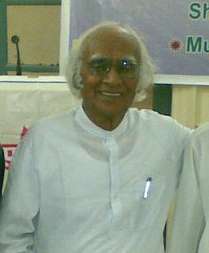Ki. Rajanarayanan
| Ki. Rajanarayanan (Tamil: கி. ராஜநாராயணன்) | |
|---|---|
|
Ki. Rajanarayanan | |
| Born |
1922 Idaicheval, Tamil Nadu, India |
| Pen name | Ki. Ra. |
| Nationality | Indian |
| Period | 1958– Present |
| Genre | Short story, novel |
| Subject | Folklores, Rural life |
| Notable works | Gopalla Grammam, Gopallapurathu Makkal, Nattuppura Kadhai Kalanjiyam |
| Notable awards | 1990 – Sahitya Akademi Award |
| Spouse | Ganavathiammal |
Ki. Rajanarayanan (Tamil: கி. ராஜநாராயணன்), popularly known by Tamil initials as Ki. Ra., is a Tamil folklorist and author from India.
Writing career
Ki. Ra.'s first published short story was Mayamaan (lit. The Magical Deer), which came out in 1958. It was an immediate success.[1][2] It was followed by many more short stories. Ki Ra's stories are usually based in karisal kaadu (scorched, drought stricken land around Kovilpatti ). He centres his stories around Karisal country's people, their lives, beliefs, struggles and folklore.[3] The novels Gopalla Grammam (lit. Gopalla Village) and its sequel Gopallapurathu Makkal (lit. The People of Gopallapuram) are among his most acclaimed; he won the Sahitya Akademi award for the latter in 1991.[4] As a folklorist, Ki. Ra. spent decades collecting folktales from the karisal kaadu and publishing them in popular magazines. In 2007, the Thanjavur based publishing house Annam compiled these folktales into a 944-page book, the Nattuppura Kadhai Kalanjiyam (Collection of Country Tales). As of 2009, he has published around 30 books. A selection of these were translated into English by Pritham K. Chakravarthy and published in 2009 as Where Are You Going, You Monkeys? – Folktales from Tamil Nadu. Ki. Ra. is well known for his candid treatment of sexual topics,[5][6] and use of the spoken dialect of Tamil language for his stories (rather than its formal written form).[7] In 2003, his short story kidai was made into a Tamil film titled Oruththi. It was screened in the International Film Festival of India.[8]
Biography
Rajanarayanan was born in Idaicheval Chathirapatti village near Kovilpatti in 1922. His full name was "Rayangala Shri Krishna Raja Narayana Perumal Ramanujam Naicker", which he shortened to Ki. Rajanarayanan. He dropped out of school in the seventh standard. He was appointed as a professor of folklore at Pondicherry University in the 1980s. He currently holds the title of Director of Folktales in the university's Documentation and Survey Centre.[7][9][10] He was a member of the Communist Party of India and went to prison twice for his participation and support in the CPI organised peasant rebellions during 1947–51.
Bibliography
- Mayamaan (lit. The magical deer) (1957)
- Gopalla Gramam (lit. Gopalla Village)
- Gopallapurathu Makkal (lit. The People of Gopallapuram)
- Karisal Kaattu kadudasi – volumes 1&2 (lit. letter from the scorched earth), Agaram (1991)
- Maraivai sonna kathaikal (lit. Hidden stories)
- (ed.)Ku Azhagurisamy kathaikal (lit. Short stories of Ku. Azhagirisamy), Sahitya Akademi
- Oruthi (screenplay)(lit. One woman)(2003)
- (ed.)Nattuppura Kadhai Kalanjiyam (lit. Collection of Country Tales), Annam (2007)
- Ki. Ra. Kathaikal (lit. Stories of Ki. Ra)
- Ki. Ra. Natkurippilirundhu (lit. From the diary of Ki. Ra)
- Vetti
References
- ↑ Maalan (21 September 2007). "இன்னும் ஒரு நூறாண்டு இரும்". Retrieved 10 March 2009.
- ↑ Rajanarayanan, Ki.; Chakravarthy, Pritham K (2009). Where Are You Going, You Monkeys? – Folktales from Tamil Nadu. Chennai, India: Blaft Publications. p. 237. ISBN 978-81-906056-4-9.
- ↑ PKR (17 August 2004). "Literary criticism". The Hindu. The Hindu Group. Retrieved 17 December 2009.
- ↑ "Sahitya Akademi Awards 1955–2007". www.sahitya-akademi.gov.in. Sahitya Akademi. Archived from the original on 31 March 2009. Retrieved 17 December 2009.
- ↑ Jai Arjun Singh (10 March 2009). "Short, Sweet, and Subversive: Blaft's Tamil Folktales". Retrieved 10 March 2009.
- ↑ Vijay Nambisan. "Stranger than fiction: Thought-provoking folktales". Deccan Herald. The Printers. Retrieved 17 December 2009.
- 1 2 Gowri Ramnarayan (17 September 2002). "Master of the Short Story". The Hindu. The Hindu Group. Retrieved 10 March 2009.
- ↑ S. Theodore Baskaran (28 November 2003). "A tale rooted in the soil". The Hindu. The Hindu Group. Retrieved 17 December 2009.
- ↑ Agrawal, S. P. (1991). Development/digression diary of India: 3D companion volume to Information India 1991–92. Concept Publishing Company. p. 49. ISBN 81-7022-305-9, ISBN 978-81-7022-305-4.
- ↑ "Ki. Rajanarayanan". The Hindu. The Hindu Group. Retrieved 17 December 2009.
